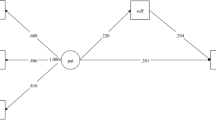Abstract
We examined the relationship between the character strength of kindness and subjective happiness (Study 1), and the effects of a counting kindnesses intervention on subjective happiness (Study 2). In Study 1, participants were 175 Japanese undergraduate students and in Study 2, participants were 119 Japanese women (71 in the intervention group and 48 in the control group). Results showed that: (a) Happy people scored higher on their motivation to perform, and their recognition and enactment of kind behaviors. (b) Happy people have more happy memories in daily life in terms of both quantity and quality. (c) Subjective happiness was increased simply by counting one’s own acts of kindness for one week. (d) Happy people became more kind and grateful through the counting kindnesses intervention. Discussion centers on the importance of kindness in producing subjective happiness.
Similar content being viewed by others
References
K. Baskerville K. Johnson E. Monk-Turner Q. Slone H. Standley S. Stansbury M. Williams J. Young (2000) ArticleTitle‘Reactions to random acts of kindness’ The Social Science Journal 37 293–298 Occurrence Handle10.1016/S0362-3319(00)00062-8
D.M. Buss (2000) ArticleTitle‘The evolution of happiness’ American Psychologist 55 5–23 Occurrence Handle10.1037/0003-066X.55.1.15
E. Diener (2000) ArticleTitle‘Subjective well-being: The science of happiness and a proposal of a national index’ American Psychologist 55 34–43 Occurrence Handle10.1037/0003-066X.55.1.34
E. Diener R.J. Larsen (1993) The experience of emotional well-being M. Lewis J. M. Haviland (Eds) Handbook of emotions Guilford New York 405–415
E. Diener M.E.P. Seligman (2002) ArticleTitle‘Very happy people’ Psychological Science 13 81–84 Occurrence Handle10.1111/1467-9280.00415
R.A. Emmons C.A. Crumpler (2000) ArticleTitle‘Gratitude as human strength: Appraising the evidence’ Journal of Social and Clinical Psychology 19 849–857
R.A. Emmons M.E. McCullough (2003) ArticleTitle‘Counting blessings versus burdens: An experimental investigation of gratitude and subjective well-being in daily life’ Journal of Personality and Social Psychology 84 377–389
B.L. Fredrickson (1998) ArticleTitle‘What good are positive emotions?’ Review of General Psychology 2 300–319 Occurrence Handle10.1037/1089-2680.2.3.300
B.L. Fredrickson (2001) ArticleTitle‘The role of positive emotions in positive psychology: The broaden-and-build theory of positive emotions’ American Psychologist 56 218–226 Occurrence Handle10.1037/0003-066X.56.3.218
Fredrickson B.L., C.A. Branigan: 2005, Positive emotions broaden scope of attention and thought-action repertoires. Cognition and Emotion 19, pp. 313–332
B.L. Fredrickson T. Joiner (2002) ArticleTitle‘Positive emotions trigger upward spirals toward emotional well-being’ Psychological Science 13 172–175 Occurrence Handle10.1111/1467-9280.00431
S. Lyubomirsky (2001) ArticleTitle‘Why are some people happier than others?’ American Psychologist 56 239–249 Occurrence Handle10.1037/0003-066X.56.3.239
S. Lyubomirsky H.S. Lepper (1999) ArticleTitle‘A measure of subjective happiness: Preliminary reliability and construct validation’ Social Indicators Research 46 137–155 Occurrence Handle10.1023/A:1006824100041
S. Lyubomirsky L. Ross (1997) ArticleTitle‘Hedonic consequences of social comparison: A contact of happy and unhappy people’ Journal of Personality and Social Psychology 73 1141–1157 Occurrence Handle10.1037/0022-3514.73.6.1141
S. Lyubomirsky K.L. Tucker (1998) ArticleTitle‘Implications of individual differences in subjective happiness for perceiving, interpreting, and thinking about life events’ Motivation and Emotion 22 155–186 Occurrence Handle10.1023/A:1021396422190
S. Lyubomirsky K.L. Tucker F. Kasri (2001) ArticleTitle‘Responses to hedonic conflicting social comparisons: Comparing happy and unhappy people’ European Journal of Social Psychology 31 511–535 Occurrence Handle10.1002/ejsp.82
M.E. McCullough R.A. Emmons J. Tsang (2002) ArticleTitle‘The grateful disposition: A conceptual and empirical topography’ Journal of Personality and Social Psychology 82 112–127 Occurrence Handle10.1037/0022-3514.82.1.112
M.E. McCullough S.D. Kilpatrick R.A. Emmons D.B. Larson (2001) ArticleTitle‘Is gratitude a moral affect?’ Psychological Bulletin 127 249–266 Occurrence Handle10.1037/0033-2909.127.2.249
M.E. McCullough J. Tsang R.A. Emmons (2004) ArticleTitle‘Gratitude in intermediate affective terrain: links of grateful moods to individual differences and daily emotional experience’ Journal of Personality and Social Psychology 86 295–309 Occurrence Handle10.1037/0022-3514.86.2.295
N. Park C. Peterson M.E.P. Seligman (2004) ArticleTitle‘Strengths of character and well-being’ Journal of Social and Clinical Psychology 23 603–619 Occurrence Handle10.1521/jscp.23.5.603.50748
C. Peterson M.E.P. Seligman (2004) Character strengths and virtues: A handbook and classification American Psychological Association Washington DC
L. Seidlitz E. Diener (1993) ArticleTitle‘Memory for positive versus negative life events: Theories for the differences between happy and unhappy persons’ Journal of Personality and Social Psychology 64 654–664 Occurrence Handle10.1037/0022-3514.64.4.654
L. Seidlitz R.S. Wyer E. Diener (1997) ArticleTitle‘Cognitive correlates of subjective well-being: The processing of valenced life events by happy and unhappy persons’ Journal of Research in Personality 31 240–256 Occurrence Handle10.1006/jrpe.1997.2184
M.E.P. Seligman (2003) ArticleTitle‘Positive psychology: Fundamental assumptions’ Psychologist 16 126–127
M.E.P. Seligman M. Csikszentmihalyi (2000) ArticleTitle‘Positive psychology: An introduction’ American Psychologist 55 5–14 Occurrence Handle10.1037/0003-066X.55.1.5
S. Shimai K. Otake N. Utsuki A. Ikemi S. Lyubomirsky (2004) ArticleTitle‘Development of Japanese subjective happiness scale, (SHS), and its examination of validity and reliability’ Japanese Journal of Public Health 51 1–9
E. Strack M. Argyle N. Schwarts (1991) Subjective well-being Oxford Pergamon
E. Suh E. Diener S. Oishi H.C. Triandis (1998) ArticleTitle‘The shifting basis of life satisfaction judgments across cultures: Emotions versus norms’ Journal of Personality and Social Psychology 74 482–493 Occurrence Handle10.1037/0022-3514.74.2.482
P.C. Watkins (2004) Gratitude and subjective well-being R. A. Emmons M. E. McCullough (Eds) The psychology of gratitude Oxford University Press New York 167–192
P.C. Watkins K. Woodward T. Stone R.L. Koths (2003) ArticleTitle‘Gratitude and happiness: Development of a measure of gratitude, and relationships with subjective well-being’ Social Behavior and Personality 31 431–452 Occurrence Handle10.2224/sbp.2003.31.5.431
Author information
Authors and Affiliations
Corresponding author
Rights and permissions
About this article
Cite this article
Otake, K., Shimai, S., Tanaka-Matsumi, J. et al. Happy People Become Happier through Kindness: A Counting Kindnesses Intervention. J Happiness Stud 7, 361–375 (2006). https://doi.org/10.1007/s10902-005-3650-z
Issue Date:
DOI: https://doi.org/10.1007/s10902-005-3650-z




